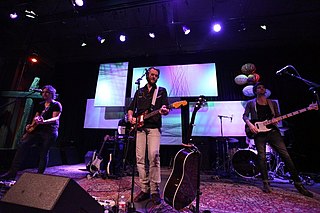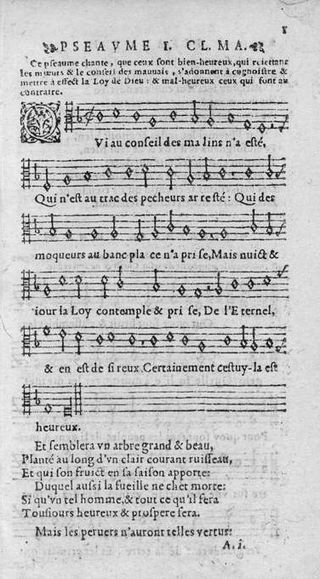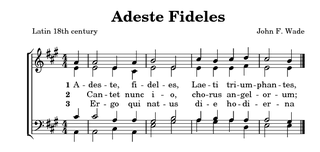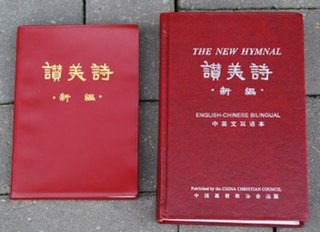The Christadelphians are a restorationist and nontrinitarian Christian denomination. The name means 'brothers and sisters in Christ', from the Greek words for Christ (Christos) and brothers (adelphoi).

A hymn is a type of song, and partially synonymous with devotional song, specifically written for the purpose of adoration or prayer, and typically addressed to a deity or deities, or to a prominent figure or personification. The word hymn derives from Greek ὕμνος (hymnos), which means "a song of praise". A writer of hymns is known as a hymnist. The singing or composition of hymns is called hymnody. Collections of hymns are known as hymnals or hymn books. Hymns may or may not include instrumental accompaniment.

A hymnal or hymnary is a collection of hymns, usually in the form of a book, called a hymnbook. They are used in congregational singing. A hymnal may contain only hymn texts ; written melodies are extra, and more recently harmony parts have also been provided.

Isaac Watts was an English Congregational minister, hymn writer, theologian, and logician. He was a prolific and popular hymn writer and is credited with some 750 hymns. His works include "When I Survey the Wondrous Cross", "Joy to the World", and "Our God, Our Help in Ages Past". He is recognised as the "Godfather of English Hymnody"; many of his hymns remain in use today and have been translated into numerous languages.

Contemporary worship music (CWM), also known as praise and worship music, is a defined genre of Christian music used in contemporary worship. It has developed over the past 60 years and is stylistically similar to pop music. The songs are frequently referred to as "praise songs" or "worship songs" and are typically led by a "worship band" or "praise team", with either a guitarist or pianist leading. It has become a common genre of music sung in many churches, particularly in charismatic or non-denominational Protestant churches with some Roman Catholic congregations incorporating it into their mass as well.

Anglican church music is music that is written for Christian worship in Anglican religious services, forming part of the liturgy. It mostly consists of pieces written to be sung by a church choir, which may sing a cappella or accompanied by an organ.
Kingdom songs are the hymns sung by Jehovah's Witnesses at their religious meetings. Since 1879, the Watch Tower Society has published hymnal lyrics; by the 1920s they had published hundreds of adapted and original songs, and by the 1930s they referred to these as "Kingdom songs" in reference to God's Kingdom.
Decisions concerning the conduct of public worship in the Church of Scotland are entirely at the discretion of the parish minister. As a result, a wide variety of musical resources are used. However, at various times in its history, the General Assembly has commissioned volumes of psalms and hymns for use by congregations.

Exclusive psalmody is the practice of singing only the biblical Psalms in congregational singing as worship. Today it is practised by several Protestant, especially Reformed denominations. Hymns besides the Psalms have been composed by Christians since the earliest days of the church, but psalms were preferred by the early church and used almost exclusively until the end of the fourth century. During the Protestant Reformation, Martin Luther and many other reformers, including those associated with the Reformed tradition, used hymns as well as psalms, but John Calvin preferred the Psalms and they were the only music allowed for worship in Geneva. This became the norm for the next 200 years of Reformed worship. Hymnody became acceptable again for the Reformed in the middle of the nineteenth century, though several denominations, notably the Reformed Presbyterians, continue the practice of exclusive psalmody.
The New Century Hymnal is a comprehensive hymnal and worship book published in 1995 for the United Church of Christ. The hymnal contains a wide-variety of traditional Christian hymns and worship songs, many contemporary hymns and songs, and a substantial selection of "world music" selections origin, a full lectionary-based Psalter, service music selections, and a selection of liturgies from the UCC Book of Worship (1986). Generally speaking, the hymnal is theologically within the mainline Protestant tradition, with a slant toward liturgical forms.
Hymns are an important part of the history and worship of the Church of Jesus Christ of Latter-day Saints.

Hymns of the Church of Jesus Christ of Latter-day Saints is the official hymnal of the Church of Jesus Christ of Latter-day Saints . Published in English in 1985, and later in many other languages, it is used throughout the LDS Church. This article refers to the English version. The book was published on the 150th anniversary of the publication of the first LDS hymnbook, compiled by Emma Smith in 1835. Previous hymnbooks used by the church include The Manchester Hymnal (1840), The Psalmody (1889), Songs of Zion (1908), Hymns (1927), and Hymns (1948).

Hymns Ancient and Modern is a hymnal in common use within the Church of England, a result of the efforts of the Oxford Movement. The hymnal was first published in 1861. The organization publishing it has now been formed into a charitable trust, Hymns Ancient and Modern Ltd, and as of 2022 it publishes a wide range of hymnals as well as other theological and religious books and magazines, under imprints such as the Canterbury Press and SCM Press.

The Jubilate Group is a Christian publishing house that administers copyright for more than sixty composers and writers. The group was founded by Michael Baughen in the 1960s. The group's first production was Youth Praise. In 1982, Jubilate published Hymns for Today's Church, one of the first hymn books with completely modernised language. In 1999, Sing Glory, Jubilate's most recent major hymn book, was published.

A hymn tune is the melody of a musical composition to which a hymn text is sung. Musically speaking, a hymn is generally understood to have four-part harmony, a fast harmonic rhythm, with or without refrain or chorus.
Hymnology is the scholarly study of religious song, or the hymn, in its many aspects, with particular focus on choral and congregational song. It may be more or less clearly distinguished from hymnody, the creation and practice of such song. Hymnologists, such as Erik Routley, may study the history and origins of hymns and of traditions of sung worship, the biographies of the women and men who have written hymns that have passed into choral or congregational use, the interrelationships between text and tune, the historical processes, both folk and redactional, that have changed hymn texts and hymn tunes over time, and the sociopolitical, theological and aesthetic arguments concerning various styles of sung worship.

The Chinese New Hymnal was published in the early 1980s and is the main hymnal used by the Protestant churches registered through the TSPM in present-day China.
Hymns of Universal Praise, a Chinese hymnal published in 1936, is considered to be an ecumenical attempt at Chinese hymnology from the early twentieth century. According to the Hong Kong hymnologist Andrew Leung, the first edition, HUP1936, established the foundation of Chinese hymnody and is now set as a model of Chinese hymnology.












